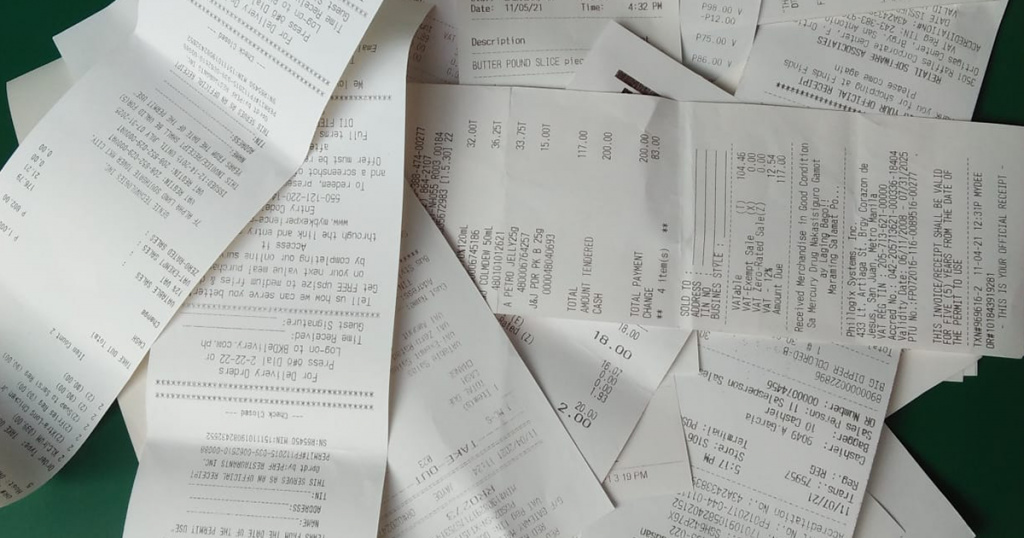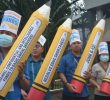
Photo courtesy of IDIS, EcoWaste Coalition
DAVAO CITY, Philippines — Shop cashiers here are worried to learn from a recent study that says chemical toxins harmful to humans are found in thermal receipts used in establishments including the ones they hand out day by day.
“That’s scary! We were not informed that receipts can be harmful to us. We cannot resist holding that in our work because that is what we give to our customers,” Cheska (not her real name), who has worked as a cashier in a fast food chain for eight years, told davaotoday.com in vernacular.
BPA, BPS
A study made by Wonjin Institute for Occupational and Environmental Health (WIOEH) of South Korea showed that thermal receipts used by most establishments in the country contain Bisphenol A (BPA) and Bisphenol S (BPS).
The study was assisted by environmental groups Interfacing Development Interventions for Sustainability in Davao City and Ecowaste Coalition, which collected thermal receipts through ‘purposive sampling’ following the categorization of local franchise stores, drugstores, government offices, public taxis, and delivery in Metro Manila and Davao City.
The samples sent to WIOEH for analysis showed that tickets or receipts from hospitals, banks, and large major supermarkets have a high percentage of BPA.
Meanwhile, receipts from delivery, general retail shops, supermarkets or convenience stores, and global franchise stores have a high percentage of BPS.
BPA is a chemical compound primarily used in the manufacturing of various plastics, while BPS, an organic compound with the formula (HOC₆H₄) ₂SO₂, is commonly used in curing fast-drying epoxy resin adhesives.
WIOEH’s study said that exposure to both BSP and BPA causes high risks in pregnancy and fetal disorders such as miscarriage, polycystic ovary syndrome, uterine hemorrhage, preeclampsia, diabetes, fetal growth restriction, and pre-term birth.
There are also effects on parental and childhood exposure such as reproductive system impairment, altered neurodevelopment, and obesity as well as other potential health concerns like heart problems, hypertension, and peripheral artery diseases.
Thermal receipt printing is widely used in commerce and chains in Southeast Asian countries and is increasingly popular in the Philippines without specific regulations and policy limits in place.
Practices in Davao
Davao Today shared these results to Cheska and other cashiers and they expressed concerns.
Cheska said she has been very conscious to expose herself from harm, especially from COVID-19, fearing that it can also affect her 3-year-old daughter.
In her workplace, 15 people are assigned as cashiers per shift who, she said, usually mark the thermal receipt using their fingernails to put the table number or customer change. This practice, she said, is the easiest and fastest way especially during peak hours.
Another cashier from a 24-hour convenience store also worries about the effect of thermal receipt on his health.
“We are using either our nails or coins to mark the receipts. During our work, we always handle that. There are instances that during meal breaks, we don’t wash our hands anymore,” said Diego, not his real name.
In his experience, he puts a check mark on the receipts to indicate that the products purchased by their customers have been paid.
Another cashier from a mall here also said that it has been her practice before giving it to the customers.
“We really don’t have an idea that it can harm our health. We have been used to it,” said Jenny, not her real name.
Cheska, Diego, and Jenny said their companies did not include BPA and BSP in the list of hazardous materials inside their working place.
Recommendations
In the Philippines, the Food and Drug Administration banned the use of BPA in all baby feeding bottles and sippy cups as childcare articles but no other regulation yet governing the use of BPA/BPS particularly for thermal receipt papers.
Manny Calonzo of EcoWaste Coalition urges the government to promulgate a national policy banning BPA and BPS in thermal receipts to raise awareness and understanding on its adverse effects on people’s health. He added that local government authorities can enact complementary ordinances.
The group also urged the business sector to switch their transaction receipts using papers without BPA, BPS and other harmful compounds, and create measures to reduce human exposure to such chemicals such as shifting to electronic receipts.
Both Ecowaste and IDIS also suggest cashiers should avoid putting marks on thermal receipt using their fingernail, avoid touching the printed side of the receipt and instead hold it lightly from the backside.
Cashiers are also reminded to avoid hand to mouth contact when handling receipts, wash their hands thoroughly during breaks, after changing receipt rolls, and before eating.
However, the groups discourage cashiers from using alcohol-based hand sanitizers before or after handling receipts. Davao Today has read studies that say using hand sanitizers increase absorption to BPA. (davaotoday.com)










